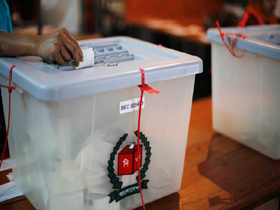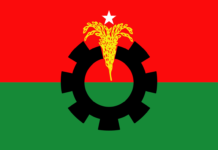M. Shahidul Islam in Toronto
“Gentlemen, get prepared to run state-affairs after October and forget your internal squabbling.” This was the advice of a commanding General of the Bangladesh army to his under-command men during a post-Eid festivity in Dhaka’s outskirts.
The information leaked the bounds of secrecy of the cantonment, and slipped out of the country through a Dhaka-based Western diplomat. The allusion to running of state affairs by the army was accompanied by the news of amassing of over 150 Armoured Personnel Carriers (APCs) from other military garrisons to the command of Dhaka’s 9th division, according to a reliable source.
Countdown to election
The assembly in Dhaka’s outskirts of most of the APCs from bordering regions sends a political message possibly at the cost of border security.
The plausibility of preparations gathering pace for possible military intervention cannot be ruled out altogether due to the expiration of the tenure of the Awami League-led regime in October, and the uncertainty about stipulated holding of an election in 90 days. The 18 party opposition alliance has vowed not to participate in that election unless a non-party caretaker government is installed to conduct free and fair polls. Mindful of what may ensue in the run-up to that election, the armed forces of the country have been ordered to prepare to quell the anticipated chaos and unrest threatened by the opposition parties to compel the government to cave in to their demand for polls under a neutral caretaker administration.
Prime Minister Sheikh Hasina has given what seemed like her last word on the protracted political impasse on August 18: “We amended the Constitution after we were voted to power by the people. We shall not change even a hairline from the constitutional stipulations. We expect all democratic political parties to take part in elections abiding by the Constitution.”
Signs of desperation
Threats are credible when a regime has time to act on such threats. The incumbent regime does not seem to have that time.
A slew of human rights abuses and genocide allegations have already sullied the image of the government within and without the country. Its popularity has sunk to the lowest depth. This was demonstrated by the outcome of the recently concluded city council polls in which the opposition candidates trounced the contestants loyal to the government by wide margin of votes.
On the other hand, the military has a gripe involving the government due to justice delayed or denied in the case of murder of 57 military officers during the Bangladesh Rifle (BDR) mutiny in February 2009. The government ignored the recommendations of an investigation conducted by the members of the armed forces. It is no secret that many of the civilians who aided and abetted the mutiny and the slaughtering of unarmed military officers were from the ruling party hierarchy. The suppressed military investigation report recommended further investigation to uncover the extent of their involvement in the heinous crime.
People at the top of the incumbent regime also fear that when removed from power, they will face the law with respect to the collusion of personages amongst them or close to them with those engaged share market swindling, the Padma bridge rent-seeking scandal and a plethora of phoney bank loan scandals. They are not, therefore, willing to quit power without being assured of some sort of indemnity.
Chasing the watchdog
No wonder that within weeks of the arrest of the chief executive, and the unlawful seizure of computers and other evidence from the office of the human rights watchdog, Odhikar, the government on August 20 indicted the New York-based Human Rights Watch (HRW) with contempt of court in the War Crimes Tribunal on account of terse comments by HRW on the Tribunal’s verdict convicting former Jamat-I-Islam leader, Golam Azam.
The move is largely symbolic. HRW does not have a resident representative in Dhaka and the Tribunal does not have jurisdiction beyond Bangladesh. Nor does the matter of a court judgement being impugned after delivery of the verdict constitute an offence of contempt of court. The judgment has been impugned by the Prosecution itself by an appeal to Supreme Court.
HRW’s condemnation of Azam’s conviction as “deeply flawed and failed to meet international standards of a fair trial” is not the real reason why the globally acclaimed rights watchdog is being challenged by the prosecutors of the Hasina regime in the War Crimes Tribunal of Bangladesh. Sheikh Hasina is wrathful about HRW on account of its publication of a damning report on Bangladesh on August 1. That report took a broad swipe against the country’s security forces (civil wing) on whom the regime has become solely dependent for its survival.
Security forces on the dock
The report’s indictment of the activities of the security forces was damning. “Bangladeshi security forces have frequently used excessive force in responding to street protests, killing at least 150 protesters and injuring at least 2,000 more since February 2013. While large numbers of protesters have been arrested, the Bangladeshi authorities have made no meaningful efforts to hold members of the security forces accountable,” the report said.
The report’s findings corroborated the allegations filed in the International Criminal Court (ICC) in early July by some US-based expatriate groups accusing the government of conducting genocide and crimes against humanity in February, March and May of 2013.
The 48-page report, “Blood On The Streets: The Use of Excessive Force During Bangladesh Protests,” is based on 95 interviews with victims and their family members, witnesses, human rights defenders, journalists, and lawyers.
One source said the Odikhar, now under seizure and its secretary, Adilur Rahman Khan, under custody, aided in some of the researches and interviews of the HRW under agreed inter-agency collaboration.
The HRW report further claimed that “Security forces have used spurious criminal charges to intimidate witnesses and family members of protesters killed by security forces. After protests, police lodged criminal complaints – called “First Information Reports,” or FIRs – against hundreds and sometimes thousands of “unknown assailants. Police would then enter the communities where protesters lived, using these reports as justification for arbitrary arrests of scores of individuals, particularly men thought to be Jamaat supporters. The sweeps left men in these communities fearful and drove many into hiding.”
Such intimidations have prevented efforts by rights groups and investigative journalists to ascertain the exact number of activists killed or missing during the May 5-6 onslaughts against the Hefajat activists in Dhaka.
The HRW report also documented examples of overt and covert pressure from authorities that resulted in shrinking space for media and civil society to independently report on anti-government agitation and on crimes committed by the security forces. “Two television stations that support opposition political parties, Islamic TV and Diganta TV, were taken off the air by the government on the night of May 5 and 6 and have been closed down ever since. The stations were reporting live from the site of the protests. The government also shut down the opposition newspaper Amar Desh and jailed its editor, Mahmdur Rahman, and other journalists, as well as four bloggers who had expressed atheistic sentiments in their writings,” said the report.
Civil unrest feared
The spectre of a brewing civil unrest that had engulfed Bangladesh since February had merely been deferred momentarily and may resurface in the wake of the upcoming general election, observers believe. “With national elections and more war crimes verdicts ahead, street protests are likely to be frequent and the risk of further violence is high,” said Brad Adams, HRW’s Asia director.
Others fear that continuing instability will result in a turnaround of or possible division amongst the country’s security forces. Predominant public sentiment rallying with the opposition and against the regime cannot but cast a shadow on the psyche of the security establishment of the nation.
Source: Weekly Holiday









